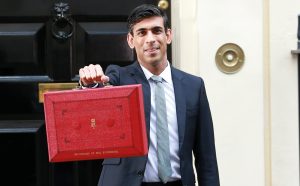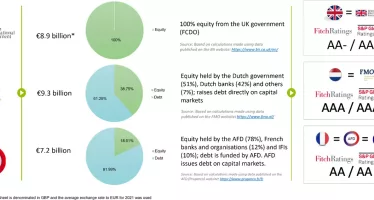Rishi Sunak: The Safest Pair of Hands for Mission Impossible

Chancellor of the Exchequer: Rishi Sunak
The Tory chancellor who’s splashing the cash, Rishi Sunak, is widely regarded as the man for the moment. But how far will he go, and can he pull off the Herculean feat of leading the UK to prosperity in the wake of the most devastating economic setback since records began?
If Britons didn’t take much notice when a new chancellor was catapulted into the cabinet in February this year, they do now. Rishi Sunak, a 39-year-old former hedge fund manager, came to the second-most-powerful political job in the UK after Sajid Javid’s dramatic flounce from office. Just a few weeks later, he has become a fixture on TV and radio — and a household name.
He was already a household name in India, thanks to his marriage in 2009 to Akshata Murthy, daughter of Indian Tech billionaire NR Narayana Murthy, co-founder of IT giant Infosys. As the MP for Richmond in Yorkshire, Sunak was fondly (if perhaps patronisingly) dubbed “the Maharaja of the Dales”. Since becoming the Coronavirus Chancellor, he’s more likely to be known as “Dishy Rishi”, having become one of Britain’s Quarantine Crushes. Apparently this new state of affairs says something about the politics of a despairing populace faced with someone who has an air of competence. Eye rolls aside, he’s certainly more of a sparkly-eyed pandemic pin-up than the governor of New York, Andrew Cuomo, for whom New Yorkers have been going gooey-eyed.
Tipped as a prime minister-in-waiting from the moment he entered the house five years ago, Sunak has found himself unexpectedly responsible for far more than he could have envisaged — but his suave and confident manner and calm optimism has scarcely wavered. Whether calmly and coolly fielding questions or announcing a series of schemes and programmes aimed at securing the UK’s financial future — the overall sense has been of a man who grasps the enormity of the situation, understands business, and is in control.
“For the first time in our history, our government is going to pay people’s wages,” he announced in a briefing on March 20. “We want to look back on this time and remember how we thought first of others and acted with decency.”
From this first speech onwards, the general consensus from all sides has been that Sunak seems to know what he’s doing. The measures seem the right ones, and he has been praised for his leadership skills – appearing calm, clear and effective amid the chaos.
But subtle signs of strain are starting to show as the pressure mounts for him to perform economic miracles. As of early June, his government-funded furlough scheme which launched him to almost rock-star fame has drained the coffers of billions, prompting a reassessment of the exit route as fears grow that the 8.9 million Britons currently furloughed could become addicted to their new status. It is, after all, easier to freeze the economy than to defrost it.
Back in February, the Bank of England was quietly whispering to industry leaders that they should gird up their loins for an anticipated two percent drop in GDP. In reality, the drop is greater than anyone could have predicted.
Government borrowing rose to £62bn in April, the highest monthly figure on record, after heavy spending to shore up the economy in the wake of the pandemic. The deficit between government spending and tax income is now so huge that to the untrained ear it has become akin to Monopoly money. It makes the sums talked about during Brexit seem like pocket change.
But Sunak is no stranger to juggling with vast sums of money. Widely believed to be one of the richest MPs in Parliament, he amassed personal wealth throughout his hedge fund career working in California, India and Britain for investment firms including Goldman Sachs. He later launched his own investment firm. And it is precisely his acute financial sense and hedge fund background that has caused many forecasters to be cautiously hopeful, even if they are crossing their fingers, legs and toes.
In many ways, Britain’s exit from the EU — of which Sunak was a firm supporter from the start — is likely to prove to be the saving of the economy. Without answering to anyone else, Britain can print as much money as it deems necessary, and inflate its way out of the debt — even if this refinancing programme is spread across generations — a luxury that others in the EU are unlikely to be able to enjoy.
Problem of Unprecedented Scale
Economic recovery will be anything but plain sailing. If there is one word that sums up everything about the pandemic and its economic devastation it’s “unprecedented”, which has been used an unprecedented number of times during recent months.
“March’s GDP contracted by 5.8 percent but that was only taking into account two weeks of actual lockdown,” says Zeb Bham, co-founder of FX firm Privalgo. “Extrapolate two weeks of March into April to June and you’re looking at contraction figures of up to 20 percent. That’s where the grey hairs are coming from.”
In Sunak’s defence, he couldn’t have expected that the measures would cost as much as they did. In the first two months of Covid, the deficit went from roughly £50bn to £337bn. Confronted with a recession that is likely to be the worst in 300 years, the tricky part for Rishi Sunak is predicting one of two outcomes:
#1 If and when they ease the lockdown, the economy makes a V-shaped recovery and he doesn’t have to do much in the way of intervention. The tax receipts will go up as businesses get back on track and narrow the deficit.
#2 will be keeping the Chancellor awake at night: the economy does not recover in a significant way, public borrowing continues apace, and “things go south quickly”, says Bham.
To date, Sunak’s arsenal of economic packages has included at least 10 recovery schemes aimed at separate sections of the economy. These include the Coronavirus Job Retention Scheme, (CJRS), announced on March 1, which brought us another Word Of The Year: furlough. This lifeline was immediately grasped by employers of all shapes and sizes when it became available on April 20 — to an extent that would have been hard to predict.
To date, Sunak’s survival and recovery portfolio includes much-lauded headline funds such as the Future Fund. Aimed at innovative and life sciences companies which are pre-revenue or pre-profit and unable to access other government business support, the Future Fund offers loans from £125k to £5m. Firms applying must have raised at least £250k in equity investment from third-party investors in the past five years, and must have been incorporated on or before December 31, 2019. The doors are currently open until the end of September.
Business bodies and organisations gushed with praise for the Future Fund, although eyebrows were raised when it was deluged with applications exceeding its original £250m budget on the first day. But while this marks its success for some, others believe it has failed to protect the businesses that really needed the support.
Stephen Page, CEO of Startup Funding Club, said Venture Capital firms hoovered up the money to protect existing portfolio companies and it failed to serve the 99 percent of “true” startups that are pre-VC. “The most vulnerable companies will miss out and many will fail as a result, their innovation and job creation potential lost from the economy,” he said.
Project Birch, announced a few weeks later, is aimed at saving strategically important companies, as pressure mounts to provide funds in return for an equity stake.
“Aviation, aerospace and steel firms are among those facing acute problems,” says Zeb Bham. “Jaguar Land Rover and Virgin are in talks right now. It’s a lot of money and it begs the question of whether or not Sunak sees himself as the new Margaret Thatcher.
“It’s estimated that government backed loans have amassed £40bn in the first two months of bailout measures alone, and forecast to reach a total of £100bn. I believe that Project Birch could be a good thing if they can reform the British Business Bank to provide more long-term growth orientated funding rather than just short-term bailouts.
“It should be said that the British Business Bank plays a central role in all of Sunak’s schemes, but it needs reforming and it’s certainly not set up to handle something on this scale in its current form. It is centralised, politicised, distant from business and short-termist; keeping in mind that its commercial success must come from growing with its borrowers rather than profiting from them.”
Other funds announced by Sunak include the Covid19 Corporate Finance Facility (CCFF); Coronavirus Business Interruption Loan Scheme, (CBILS); Coronavirus Large Business Interruption Loan Scheme (CLBILS); Bounce Back Loan Scheme (BBLS); Self-Employment Income Support Scheme; Small Business Grants Fund, (SBGF) and Retail, Hospitality and Leisure Grant Fund, (RHLGF); Hardship Grants Scheme as well as the Local Authority Discretionary Fund. He has also announced a funding programme for charities, a time-to-pay delay on VAT and tax and new sick pay terms for SMEs.
Phew. This alphabet soup represents lots of late nights for Sunak and his policy planners at the Treasury; an impressive feat of war-room planning. Working round the clock, yet still calm and collected in briefings, Sunak has definitely been earning his salary and going the extra furlong (or furlough). The schemes have not been perfect — nothing organised so quickly ever could be — but they have done the job and have certainly had massive take up. Right now, many of these support schemes are keeping businesses and employees afloat artificially and it remains to be seen what happens when that support is taken away.
It’s a remarkable paradox for a Conservative Chancellor to be overseeing such a remarkable programme of part-nationalisation of a large part of the British economy, even on a temporary basis. Right now, one in five working Britons is being paid from central government coffers. The scale and rapid introduction of Rishi’s job retention scheme was widely regarded as a positive intervention, delivered with confidence and clarity.
Now he’s faced with the monumental task of successfully weaning employers and employees off the furlough scheme — and the rise or fall of the British economy depends on whether the strategies he opts for are successful or not. In recent weeks, details of his exit plans have been slowly emerging, with new regulations for the furlough scheme being drip-fed to the media.
Since redundancy requires 45 days’ notice, as this issue of CFI.co goes to press, thousands of Britons are likely to be receiving their redundancy notices, and to avert widespread unemployment. Rishi Sunak’s focus will have to be on how to re-direct these people — ideally into the tech or green economy.
UK Government Backed Schemes & Funds
Covid19 Corporate Finance Facility (CCFF)
Launched: March 17
Who is it for?
Helps ‘larger firms’…through purchase of their short-term debt.Coronavirus Job Retention Scheme (CJRS)
Launched: April 20 (backdated to March)
Who is it for?
Businesses, charities, public authorities, recruitment agencies:
– Employers who have enrolled for PAYE online
– have a UK bank account
– created a PAYE payroll scheme before 19 March
Claims portal opened 20 April.
Pays 80 percent (reducing to 70 percent) of furloughed employee salaryCoronavirus Large Business Interruption Loan Scheme (CLBILS)
Launched: April 20
Who is it for? Businesses with group turnover of more than £45m
Maximum term three years, minimum term three months. Commercial interest rates apply.
From May 26, max loan size available rose from £50m to £200m.Coronavirus Business Interruption Loan Scheme (CBILS)
Launched: March 23
Who is it for?
UK-based SMEs.
Government-backed guarantee to lender to turn a no credit decision into a yes.
More attractive terms.
Govt will cover first six months of interest payments.
Borrower remains 100 percent liable for the debt.
Lender can provide up to £5m.
Must have sound borrowing proposal but insufficient security to meet a lender’s normal requirements.
Must be in eligible industrial sector.Bounce Back Loan Scheme BBLS
Launched: April 27
Who is it for?
For smallest businesses established before 1 March 2020.
Borrow between £2k and 25 percent of turnover up to a maximum of £50k.
No repayments due for first 12 months
Government will pay fees
Fixed interest rate of 2.5 percent.
One loan per business / six-year loan.
You can only get it if you don’t already have a CBILS, CLBILS, CCFF.Future Fund
Launched: May 20
Who is it for?
Innovative and life sciences companies who are pre-revenue or pre-profit and unable to access other government business support from eg, CBILS.
A pot of £500m set aside for loans from £125k to £5m.
Open until end of September 2020
Subject to at least match funding from private investors
Must have raised at least 250k in equity investment from third-party investors in the last five years
Companies must have been incorporated on or before 31 Dec 2019Self-Employment Income Support Scheme
Grants for self-employed or member of a partnership adversely affected by pandemic.Hardship Grants Scheme
A pot of £500m offering cash grants of up to £25,000 for smallest businesses eg sole traders.
Dispensed by local authorities to provide council tax relief to the vulnerable and households.Business rates holiday for this year
Retail, Hospitalities, and Leisure sectors.
Winners and Losers
In a recession, winners and losers become more starkly polarised, and what quickly became clear was that so-called pivoting was effortless for some and impossible for others.
Rob Mitchell, formerly at the Economist and The Financial Times, and now CEO of thinktank Longitude points out that alongside the obvious winners and losers “… the more important nuance is how prepared and resilient a company was, going into the crisis.
“Within retail, which has clearly been hit hard, there’s a big difference between those companies that were further along their digital transformation. Adaptability is also key — from small restaurants repositioning themselves as retailers to education providers shifting to online delivery.
Balance sheets clearly matter too, Mitchell believes, and those companies with a war chest to draw on have been better able to weather the storm than those that are more financially leveraged.
“And finally,” says Mitchell, “the crisis highlights the importance of brand. Companies that customers trust are more likely to survive because they have brand equity. Customers will stay with them and be loyal, whereas those companies who evidently care less about their customers will struggle.”
When it comes to brand, Sunak is certainly going to be pushing brand Britain. As industry sectors like aviation juddered to a halt and governments across the world instinctively started to retreat to protectionist language and regulations, global trade took a monumental nosedive. As trust and trade start to go hand in hand, some economic experts predict Britain will forge a fairly dramatic upturn in trade with its commonwealth countries and the gulf states, notably Saudi Arabia and Oman.
All things considered, the huge challenges Rishi faces are mirrored by equally huge opportunities — instead of retraction and protectionism, this crisis is a chance for Britain to capitalise on its innovation cred and its trading expertise. If the Chancellor can go straight from raiding the Magic Money Tree to pulling digital innovation and AI rabbits from hats, Britain could become a more prominent economic world player than ever before.
Russ Lidstone, CEO of The Creative Engagement Group, says it’s crucial that Sunak doesn’t embrace protectionism. “This is a global economic challenge and the way out of it lies in global co-operation. He should use this crisis as a catalyst for change in society and business.
“For example, he is going to have to support innovation. The next few years and our recovery will be all about innovation — in order to compete as we see greater Pacific centring and Asia achieves 50 percent global GDP. This may mean investment in infrastructure perhaps more than people in a post-COVID and AI world, but now will be the time to be bold.
“Sunak and DCMS need to take swift action to support the UK’s creative industries and prevent key culture critical symbols such as theatres and film companies failing. In terms of contribution the creative industries have received little consideration in the discourse surrounding the crisis, but as an industry that is a global leader and generates over £100bn GVA – it is hugely important economically and culturally. It is an industry heavily reliant on freelance talent as well.”
We’re Not in Kansas, Toto
The pandemic Lockdown has been called The Great Pause, and it has certainly sent shockwaves throughout the world and world economies. And as the re-set button is pressed, it’s unlikely to be a case of same old, same old.
Britain’s relationship with many of its key trading partners has been brought into sharp focus — with the biggest question of all being how reliant the UK and other counties should be on the manufacturing output of just one or two countries, such as China. Tensions around relations between UK and China have heightened during the crisis, which spawned a wave of conspiracy theories and crystallised genuine concern over the role of Huawei.
UK Prime Minister Boris Johnson faces pressure from the Trump administration and from MPs to issue a ban on Huawei, and essentially remove it from the UK’s telecoms infrastructure. But telecoms giant Vodafone has issued a warning that any ban would derail the UK from its plan to emerge as a leader in 5G technology. With the pandemic demonstrating that connectivity and a stronger telecoms infrastructure is more important than ever, Sunak could be faced with some of the most politically divisive choices of his career.
Mohammed Al Duaij, CEO of Kuwait’s Alea Global Group, told CFI magazine that in comparison with other countries, the UK has taken serious economic actions in parallel with the health actions from the beginning, encouraging the private sector to keep their employees by supporting their remuneration packages and other actions.
“In Kuwait, which is a rich but small country, up to this moment we do not have any serial action from the government to support the private sector,” he said.
“I think the UK is always in the radar of foreign investment and in the meantime taking into account Brexit it should attract foreign investment more on governmental and private sector by incentives such as tax exemptions, residency, low interest and long maturity loans.”
Henry Humphreys, partner at Humphreys Law, points out that as well as bringing trading relations under the spotlight, the crisis has been a catalyst for transitions that have been stirring for years — such as the shift to remote working and WFH, and it has also revved-up the race to go green.
“Manufacturing has shifted to China over recent decades,” he said, “and even before the pandemic there was a growing nervousness with the volume of data and knowhow going to that side.
“Over the last 20 years or so, an unbelievable level of personal data found its way to the west coast of the US which has caused a lot of concern. So there is a will to re-shore the data — and anyone who can provide tech that allows you to dictate when people have access to your data will be doing really well.”
Times are A-changin’
Economies are always expanding or contracting, and the seismic shift represented by the pandemic makes it difficult to predict how consumer demand will drive market forces once lockdown is eased.
Matthew Lesh, head of research at the Adam Smith Institute, said the economy is not a machine that can be turned on and off. “We don’t know in advance which jobs and companies are going to be useful in future,” he pointed out. “Rishi needs to let companies find their own way. He should be hesitant about bailing companies out; government is not traditionally good at picking winners, and now it sounds like they want to prop-up the losers.
“It’s hard to do politically, but very important to do economically.”
Meanwhile, the devolved governments of Scotland and Wales have been noticeably beating their own drums in response to the challenge. In Wales, where lockdown restrictions have been tighter than in England, Sophie Howe, Wales’ Future Generations Commissioner, said: “Our pre-Covid 19 economy prioritised economic growth, forced many people into poverty, and in turn created an unhealthy population that is particularly susceptible to global crises such as pandemics.”
Howe has called on Welsh ministers to “show political courage with a focus on quality of life over GDP, as the country begins the rebuilding process while restrictions remain in place to stem the spread of COVID-19”.
Among her recommendations is a multi-million-pound stimulus package to support the decarbonisation of Wales’ housing stock — putting money into low-carbon, affordable housing, and launching a national retrofitting programme to improve energy efficiency in existing homes.
As well as ramping-up investment in the low-carbon economy, Howe is pushing for Welsh Government to invest in re-skilling, and employing those who have lost jobs and income in the green economy.
May the force be with him…

Author: Naomi Snelling
Famous for his self-effacing charm and for not “working” the tearooms of Westminster, Britain’s Chancellor is privately described as easy-going and even goofy. He has joked with predecessor Sajid Javid about Star Wars and more recently praised Javid’s aim to boost education funding.
With economic miracles to perform, right now, nothing could be further from Rishi Sunak’s mind than his political pin-up status. He finds himself between business pressing for a swift release from Lockdown and a PM whose natural libertarian outlook has been cauterized by his own ITU experience with Covid-19. Rishi Sunak goes to sleep each night knowing that he is ultimately the man whose financial acuity, intellect and decisive action will decide the economic fate of Britain.
To paraphrase his sci-fi hero, may the force be with him.
Comments from Industry Leaders on the Future Fund
Michael Moore, Director General of the British Private Equity and Venture Capital Association (BVCA):
“The Future Fund is hugely significant and very welcome. For many venture capital-backed businesses it will build the bridge from today’s severe challenges to the period of recovery, enabling them to survive then thrive.
“The post-COVID economy is likely to look very different to today’s. The global leadership of venture capital-backed companies in the digital, high technology and life science parts of the UK economy will be critical to the UK’s success and this government support will help them to do that. “We anticipate strong demand for this funding and we will continue to work with the government to ensure that there is enough to achieve the objective of sustaining this strategically-important sector.”Charlotte Crosswell, CEO of Innovate Finance:
“The Future Fund is a welcome step to support our start-up and scale-up economy, and a much-needed intervention from Government to back high-growth businesses. Many FinTech companies have been unable to access the other loan schemes available, so this will provide vital funds to firms in the sector.
“The UK has a reputation as a global FinTech leader and we must make sure this remains the case. We have seen some incredible transformation of financial services from the FinTech sector over the last decade and it will play a key role in our country’s economic recovery. In addition, the opportunity to export more of these products and services to overseas markets will showcase the unique innovation the UK has built and the role Fintech can play.”Julian David, CEO of TechUK:
“The Future Fund is a strong statement of intent from the UK Government on the value of innovative companies and their importance, not only now, but for the strategic interests of the UK’s economic future.
“I’m pleased to see that the Government has worked to expand the scope of the scheme to make it more inclusive and accessible. It is crucial that as we rebuild our economy and look to the future, we ensure everyone is able to benefit equally. TechUK will continue to work with Government, our members and the tech community to ensure we build a future ready for what comes next.”Gerard Grech, CEO of Tech Nation:
“We are delighted to see that the Future Fund is now open for applications and are grateful for HMT’s work over the past few weeks to ensure that as many businesses as possible can access the liquidity they need. This is an important step to provide investment to pre-profit, pre-revenue businesses with a cash injection to get them through these challenging times.”Irene Graham, CEO of the ScaleUp Institute:
The Future Fund is an important initiative and takes us another step forward in meeting the needs of the UK’s scaleups at this time, who employ 3.5m people across all industry sectors and regions. We welcome the streamlined and investor-led process which will enable swift execution, getting money out as quickly as possible across the country. This is part of a suite of financial solutions needed for scaleups and we welcome the fact the Government will continue to keep it under review as its take-up develops.”Jenny Tooth OBE, CEO of UK Business Angels Association (UKBAA):
“UK Business Angels Association congratulates the Government for bringing this important initiative so rapidly into the market. The Future Fund responds to the needs of innovating growth focused businesses that may have had investment from angel investors in their early growth stages and now have the capability to benefit from the support of a Convertible Loan alongside VC investment. This will bring vital further finance to enable them to address the impact of the Covid 19 crisis and ensure their continuing ability to build and scale their business.”
“We recognise that many equity backed small businesses right across the UK are developing vital innovative products and services and that have the capacity to help the growth of our economy in the months ahead as we emerge into economic recovery. Yet many of these businesses need further support and investment to withstand the impact of the Covid-19 crisis to ensure that they can survive and successfully continue to build and commercialise their innovations. UKBAA acknowledges the importance of the new Future Fund offering a vital new £250m of support through a Convertible Loan Note, alongside matching VC or other relevant third party investors to enable these innovating businesses to successfully survive and lay the foundations for further significant growth”.Erin Platts, Head of EMEA and President of the UK Branch, Silicon Valley Bank:
“We see the Future Fund as a very positive step in supporting the UK’s Innovation Economy. It is great news that the Fund has moved swiftly to implementation and from today innovation companies and their investors will be able to apply to access the funds they need to help them through this period and support their growth plans. The Future Fund is one way to protect the UK’s thriving innovation and life sciences industries to help maintain our place as one of the most attractive and successful tech hubs globally. The Future Fund will provide valuable investment to extend runway for UK start-ups and scale-ups, allowing them to continue to operate, preserve and create jobs and build the technologies of the next decade and beyond. We are also pleased to see inclusion and diversity efforts being front of mind as part of the fund’s process, something we greatly welcome and support. We will continue to assist and partner with UK innovation companies and their investors through this initiative and other government programmes.”
You may have an interest in also reading…
OECD: The Funding Models of Development Finance Institutions
The drum beat of reform is increasing for the development system and particularly for the Multilateral Development Banks (MDBs). While
The International Financial Institutions: Collaboration for Development and Growth
Leaders of the African Development Bank, European Bank for Reconstruction and Development, Inter-American Development Bank, International Monetary Fund, and the
OECD: What Will It Take to Achieve UN’s Sustainable Development Goals?
Achieving the UN’s Sustainable Development Goals (SDGs) requires financial and non-financial investment to discover sustainable development pathways. One of the
















































































